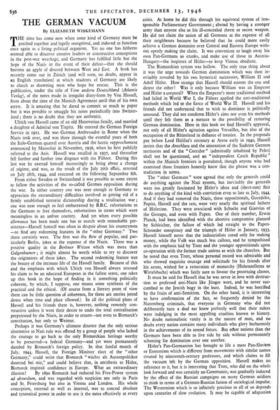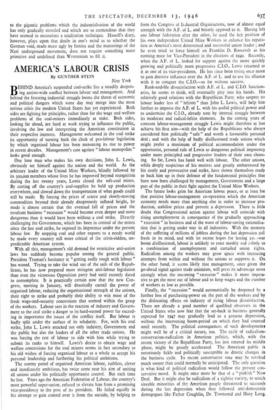THE GERMAN VACUUM
By ELIZABETH WISKEMANN
THE time has come now when some kind of Germany must be patched together and legally recognised, and induced to function once again as a living political organism. Yet no one has hitherto seemed able to discover creative leaders or constructive conceptions in the post-war wreckage, and Germany has fulfilled little but the hope of the Nazis in the event of their defeat—that she should become an apple of discord between West and East. A book has recently come out in Zurich (and will soon, no doubt, appear in an English translation) at which students of Germany are likely to clutch as drowning men who hope for rescue. This is the publication, under the title of Vom andern Deutschland (Atlantis Verlag), of the notes made in irregular diary-form by Von Hassell, from about the time of the Munich Agreement until that of his own arrest. It is amazing that he dared to commit so much to paper but it was possible to smuggle his notes periodically into Switzer- land ; there is no doubt that they are authentic. THE time has come now when some kind of Germany must be patched together and legally recognised, and induced to function once again as a living political organism. Yet no one has hitherto seemed able to discover creative leaders or constructive conceptions in the post-war wreckage, and Germany has fulfilled little but the hope of the Nazis in the event of their defeat—that she should become an apple of discord between West and East. A book has recently come out in Zurich (and will soon, no doubt, appear in an English translation) at which students of Germany are likely to clutch as drowning men who hope for rescue. This is the publication, under the title of Vom andern Deutschland (Atlantis Verlag), of the notes made in irregular diary-form by Von Hassell, from about the time of the Munich Agreement until that of his own arrest. It is amazing that he dared to commit so much to paper but it was possible to smuggle his notes periodically into Switzer- land ; there is no doubt that they are authentic.
Ulrich von Hassell came of an old Hanoverian family, and married a daughter of Admiral von Tirpitz. He entered the German Foreign Service in 1911. He was German Ambassador in Rome when the Nazis took over, and was there through the eventful years of both the halo-German quarrel over Austria and the hectic rapprochement announced by Mussolini in November, 1936, when he first publicly referred to the Axis. Hassell was recalled in 1937, and thereafter fell further and further into disgrace with the Fiihrer. During this last war he exerted himself increasingly to bring about a change of regime, and was, as the result •of the July zoth affair, arrested on July 28th, 1944, and executed on the following September 8th.
From either Sweden or Switzerland it was possible to some extent to follow the activities of the so-called German opposition during the war. In either country one was near enough to Germany to appreciate the extraordinary difficulties involved in getting rid of a firmly established terrorist dictatorship during a totalitarian war ; one was near enough to feel embarrassed by B.B.C. exhortations to the Germans to free themselves, exhortations in terms which were meaningless in an unfree country. And yet when every possible allowance has been made one has to search with remarkable per- sistence—Hassell himself was often in despair about his countrymen —to find any redeeming features in the " other Germany." Two there certainly were. The first was the flow of popular, and par- ticularly Berlin, jokes at the expense of the Nazis. There was a positive quality in the Berliner Witzen which was more than Galgenhumor ; it might almost be worth while to try to discover the originators of these jokes. The second redeeming feature was the beauty of the intimate life of the Hassell family. Because of this and the emphasis with which Ulrich von Hassell always stressed his claim to be an educated European in the fullest sense, one takes up this book in the hope of finding in it something politically coherent, by which, I suppose, one means some synthesis of the practical and the ethical. (Of course from a literary point of view there can be little question of coherence, for these are entries jotted down when time and place allowed.) In all the political plans of Hassell and his friends there is, however, nothing remotely con- structive unless it were their desire to undo the total centralisation perpetrated by the Nazis, in order to return—not even to Bismarck's constitution, but only to Weimar.
Perhaps it was Germany's ultimate disaster that the only serious alternative to Nazi rule was offered by a group of people who lacked the courage to go back to the only Bismarckian heritage worthy to be preserved—a federal Germany—and yet were permanently dazzled by Bismarck's foreign policy. In that fateful month of July, 1944, Hassell, the Foreign Minister elect of the "other Germany," could write that Bismarck " wachst als Aussenpolitiker dauernd bei mir," and could believe that, in antithesis to Hitler, Bismarck inspired confidence in Europe. What an extraordinary
illusion! By 1890 Bismarck had reduced his Five-Power system ad absurdum, and was regarded with suspicion not only in Paris and St. Petersburg but also in Vienna and London. His whole conception, external as well as internal, was to conceal absolute and tyrannical power in order to use it the more effectively at every crisis. At home he did this through his equivocal system of irre- sponsible Parliamentary Government ; abroad by having a stronger army than anyone else as his ill-concealed threat or secret weapon. He did not claim the union of all Germans at the expense of all their neighbours because he believed that he could more easily achieve a German dominion over Central and Eastern Europe with- out openly making the claim. It was convenient to laugh away his own Pan-Germans as cranks, and make use of those in Austria- Hungary—the inspirers of Hitler—to keep Vienna obedient.
The Bismarckian system was hollow. The only true thing about it was the urge towards German domination which was then in- evitably revealed by his two hysterical successors, William II and Adolf Hitler. How strange that Hassell should esteem the one and detest the other! Was it only because William was an Emperor and Hitler a corporal? When the Emperor's more traditional method had failed in World War I, the Fiihrer applied the anti-traditional methods which led to the fiasco of World War II. Hassell and his friends did not understand that to wish to dominate is politically unsound. They did not condemn Hitler's aims nor even his methods until they felt them as a menace to the possibility of restoring German domination. Here in this book we find Hassell's approval, not only of all Hitler's agitation against Versailles, but also of the occupation of the Rhineland in defiance of treaties. In the proposals put before Lord Halifax's emissary at Arosa early in 1940, Hassell insists that the Anschluss and the annexation of the Sudeten German territories and of the " Corridor " (admittedly inhabited by Poles) shall not be questioned, and an " independent Czech Republic " within the Munich frontiers is postulated, though anyone who had examined those frontiers honestly knew that the phrase was a con- tradiction in terms.
The " other Germans " were agreed that only the generals could do anything against the Nazi system, but inevitably the generals were too greatly fascinated by Hitler's ideas and (short-run) flair to do anything of the kind with conviction even so late as July, 1944. And if they had removed the Nazis, these oppositionals, Goerdeler, Popitz, Hassell and the rest, were very nearly the spiritual fathers of Hitlerism. They were associated with Schacht and Gisevius of the Gestapo, and even with Papen. One of their number, Erwin Planck, had been identified with the abortive compromise planned by Schleicher, the failure of which led straight to the Papen- Schroeder conspiracy and the triumph of Hitler in January, 1933. Hassell himself notes that the industrialists cared only for making money, while the Volk was much less callous, and he sympathised with the emphasis laid by Trott and the younger oppositionals upon co-operation with the former trade unions as with the churches. But he noted that even Trott, whose personal record was admirable and who showed exquisite courage and solicitude for his friends after his arrest, wished for a restoration of monarchy (Hohenzollerns or Wittelsbachs) which was fairly sure to favour the possessing classes.
It must be said for Hassell that he was never in love with destruc- tion as professed anti-Nazis like Finger were, and he never suc- cumbed to the Jewish bogy in the least. Indeed, he was horrified by the fruits of anti-Semitism. On the other hand, it is interesting to have confirmation of the fact, so frequently denied by the Nuremberg criminals, that everyone in Germany who did not deliberately turn a deaf ear knew perfectly well that their rulers were indulging in the most appalling cruelties known to history. No doubt nationalistic vanity is in the nature of man, and no doubt every nation contains many individuals who glory barbarously in the achievements of its armed forces. But other nations than the Germans have been able to live side by side without permanently scheming for domination over one another.
Hitler's Pan-Germanism has brought to life a mass Pan-Slavism or Easternism which is different from movements with similar names created by nineteenth-century professors, and which claims to fill the vacuum left by the German opposition. Hassell makes no reference to it, but it is interesting that Trott, who did on the whole look forward and was certainly no Communist, was gradually induced by the effect of the Russian campaigns on many German soldiers to think in terms of a German-Russian fusion of sociological impulse. The Westernism which is so infinitely precious to all of us depends upon centuries of slow evolution. It may be capable of adaptation to she gigantic problems which the industrialisation of the world has only gradually revealed and which are so tremendous that they have seemed to necessitate a totalitarian technique. Hassell's diary, however, plays upon that doubt in one's mind as to whether the German void, made more ugly by famine and the mutterings of the Nazi underground movement, does not require something more primitive and undefined than Westernism to fill it.



































 Previous page
Previous page